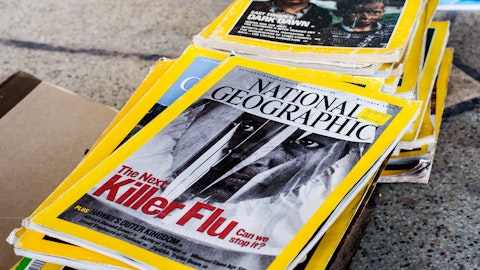Welcome to the 11 best science documentaries on Netflix streaming in 2015.
Science can often be fascinating and fun, but due to its complexity, people quickly get bored with it. They simply lack the knowledge to understand the truly cool concepts and ideas, or the patience to learn about them. Cue the science documentaries. In them, hosts, often scientists themselves, explain those concepts in a way that everyone can understand them, even us without Ph.D. That is why they are so popular. They are also a great way for kids to both learn and get interested in science, and as such are often played in classrooms all over the world. Although not many of science documentaries are listed in the best rated documentaries on Netflix, they are still very entertaining and can offer you a chance to spend some quality time with your kids, without actually going through a hassle of getting up from you couch. A win-win situation, if you ask me.

science photo/Shutterstock.com
To rank 11 best science documentaries on Netflix streaming in 2015, we used our standard formula. Going simply by IMDb rating just wouldn’t cut it, although we did include it in our final ranking. We also scoured dozen of lists on most popular sites in order to get an accurate feel for public opinion. We mixed it all together and came up with a genuine Insider Monkey ranking. We hope you’ll enjoy watching them.
11. The City Dark
Site Score: 1, IMDb Score: 2, Overall Score: 3
Directed by Ian Cheney
Year: 2011
The humankind has lost the night. Ever since our ancestors raised their heads for the first time and gazed at the vast night sky filled with stars, we have been inspired by them. But since the beginning of the 20th century and the ever spreading night lights that illuminated our cities, we have lost that ability. Ian Cheney says in the documentary that, since moving to New York, he saw the stars twice, both times during the infamous New York blackouts. The stars have been with us since the beginning and now we are deprived of them by the urban sprawl spreading the light pollution all over the planet. How does this affect us as a species? The City Dark won awards at several film festivals, including Hardacre Film Festival and SXSW Film Festival.
10. Codebreaker
Site Score: 2, IMDb Score: 1, Overall Score: 3
Directed by Clare Beavan and Nic Stacey
Year: 2011
Alan Turing’s contribution to the Allied war effort in World War 2 was immeasurable. If he didn’t achieve anything else in his life (and he did), breaking of the German Enigma code would be enough to secure his place in history. But the subject of Codebreaker isn’t Dr. Turing’s war record. It is about his conviction and death, told through the diaries of his psychiatrist, Dr. Franz Greenbaum. It is fascinating and terrifying at the same time to watch how a backward laws, implemented by a shortsighted government, can drive a brilliant man, the founder of computer science, to suicide, despite all he has done for his country. The injustice was slightly corrected by the apology and later pardon issued by the British government in 2012.
9. Cave of Forgotten Dreams
Site Score: 3, IMDb Score: 4, Overall Score: 7
Directed by Werner Herzog
Year: 2011
Chauvet Cave in southern France, with its hundreds of paintings, is one of the most important prehistoric sites in the world. Due to its heavy protection by the French government and the conservation underway inside the cave, the access has been restricted to the general public. Werner Herzog managed to obtain permission to film inside the cave, but with various limitations. The filming process, with just 4 people allowed into the cave, wearing special clothing and filming restricted to only four hours daily for six days deserves a documentary in itself. The final product is nothing but spectacular, and it won 9 awards on as many festivals around the world.
8. Bigger, Stronger, Faster
Site Score: 4, IMDb Score: 5, Overall Score: 9
Directed by Christopher Bell
Year: 2008
Despite all the stigma attached to them, performance-enhancing drugs have been a reality in sports for quite some time. The heavy competition makes it harder and harder each year for athletes to achieve their dreams and resorting to pharmaceuticals for getting them to the top is nothing new. But how much exactly are these chemical compounds widespread in the world of the US sport? Christopher Bell explores this subject on his own example and that of his brothers’, all three of them being aspiring bodybuilders. The emphasis of the documentary is placed on how the American do-or-die attitude leads to drug abuse in sport. Bigger, Stronger, Faster premiered at Sundance Film Festival in 2008.
7. Particle Fever
Site Score: 10, IMDb Score: 3, Overall Score: 13
Directed by Mark Levinson
Year: 2013
CERN’s Large Hadron Collider is the largest experimental facility ever built. The price tag alone of $9 billion sets it far above any other experiment in human history. The project was surrounded by doubt and negative press, as well as malfunctions in its early stage. For a while, the notion that it will all be for nothing was very present in the lives of physicists working at CERN. However, they managed to overcome all obstacles and in 2012, their efforts were rewarded with the discovery of Higgs-like particle. The documentary was seven years in the making and is praised for its easily understandable explanations of complex experimental physics’ terms.
6. Your Inner Fish
Site Score: 5, IMDb Score: 9, Overall Score: 14
Directed by Tom Cook, David Dugan, and Alex Tate
Year: 2014
Your Inner Fish is a three-part series produced by the PBS. Hosted by Neil Shubin, the series goes into depth explaining the evolutionary mechanisms that led to a modern human, paying special attention to our ancestors and what did we inherit from each one of them. The links that connect us to creatures that existed more than 3 billion years in the past are quite fascinating. Shubin uses fossils scattered all over the globe to explain our connection to reptiles, fish, and primates. The documentary won Outstanding Graphic Design & Art Direction in 2015 Emmy Awards.
5. What Plants Talk About
Site Score: 6, IMDb Score: 8, Overall Score: 14
Directed by Erna Buffie
Year: 2013
A part of Nature series on PBS, What Plants Talk About hosted by J.C. Cahill is 5th on our list of 11 best science documentaries on Netflix streaming in 2015. We are shown that plants aren’t that much different from humans and that they too can communicate, have allies and even go to war. Despite the light-hearted mode of the documentary, it manages to convey to us the incredible complexness of plant world. The relationships they form are far more complicated than you would think possible. Their communication skills are fairly developed, it’s just that we don’t know how to understand them.
4. Grizzly Man
Site Score: 8, IMDb Score: 7, Overall Score: 15
Directed by Werner Herzog
Year: 2006
Another Werner Herzog documentary on our list, Grizzly Man tells the story of Timothy Treadwell. Treadwell was a frequent visitor to Katmai National Park and Preserve, Alaska. He spent 13 summers camping in the wilderness and used his time to approach bears that roamed the park. He filmed over 100 hours of material, some of which Werner Herzog used in creating his documentary. But in 2003, while camping with his girlfriend, something went wrong, and both of them were killed and eaten by bears. Treadwell’s tapes contained an audio recording of the attack, which Herzog decided not to use in the film, regarding them too disturbing.
3. Antarctica: A Year on Ice
Site Score: 9, IMDb Score: 6, Overall Score: 15
Directed by Anthony Powell
Year: 2013
Antarctica is one of the most inhospitable places for humans on our planet. Yet, people live there. Most of them are scientists, performing various experiments and collecting samples, but some of them are ordinary people, tasked with keeping the habitats in order and maintaining the equipment needed for everyday life in such harsh conditions. This is their story. Anthony Powell filmed the material for 15 years and most of it have never been seen before. As a Frozen Planet photographer, he had almost unlimited access to the station and its people. Ever wondered what it would be like to spend a winter in Antarctica? Here’s your chance.
2. Life
Site Score: 7, IMDb Score: 11, Overall Score: 18
Directed by N/A
Year: 2009
Consisting of 10 episodes, each 50 minutes long, this BBC masterpiece sets out with a very ambitious goal: to cover entire life on our planet in 500 minutes. Since it is BBC, they pretty much nailed it. Narrated by Sir David Attenborough, the series does a wonderful job of representing each major group in animal and plant kingdoms. The final episode deals with our closest relatives, primates. Life won an Emmy in 2010 for Outstanding Cinematography for Nonfiction Programming.
1. Human Planet
Site Score: 11, IMDb Score: 10, Overall Score: 21
Directed by N/A
Year: 2011
And the first place on our list 11 best science documentaries on Netflix streaming in 2015 goes to the masters of nature documentaries, BBC, and their hit series Human Planet. Divided into eight episodes, each dealing with a different habitat, the series illustrates how adaptable humans are and how we managed to conquer almost every part of our planet, despite vastly different conditions. Ocean, Desert, Arctic, Jungle, Mountains, Grasslands, Rivers, and finally Urban Jungle, are the names of the episodes, depicting the kind of surroundings they depict. Each episode features several human groups specialized in its given environment. The series won one Emmy and one BAFTA award.





